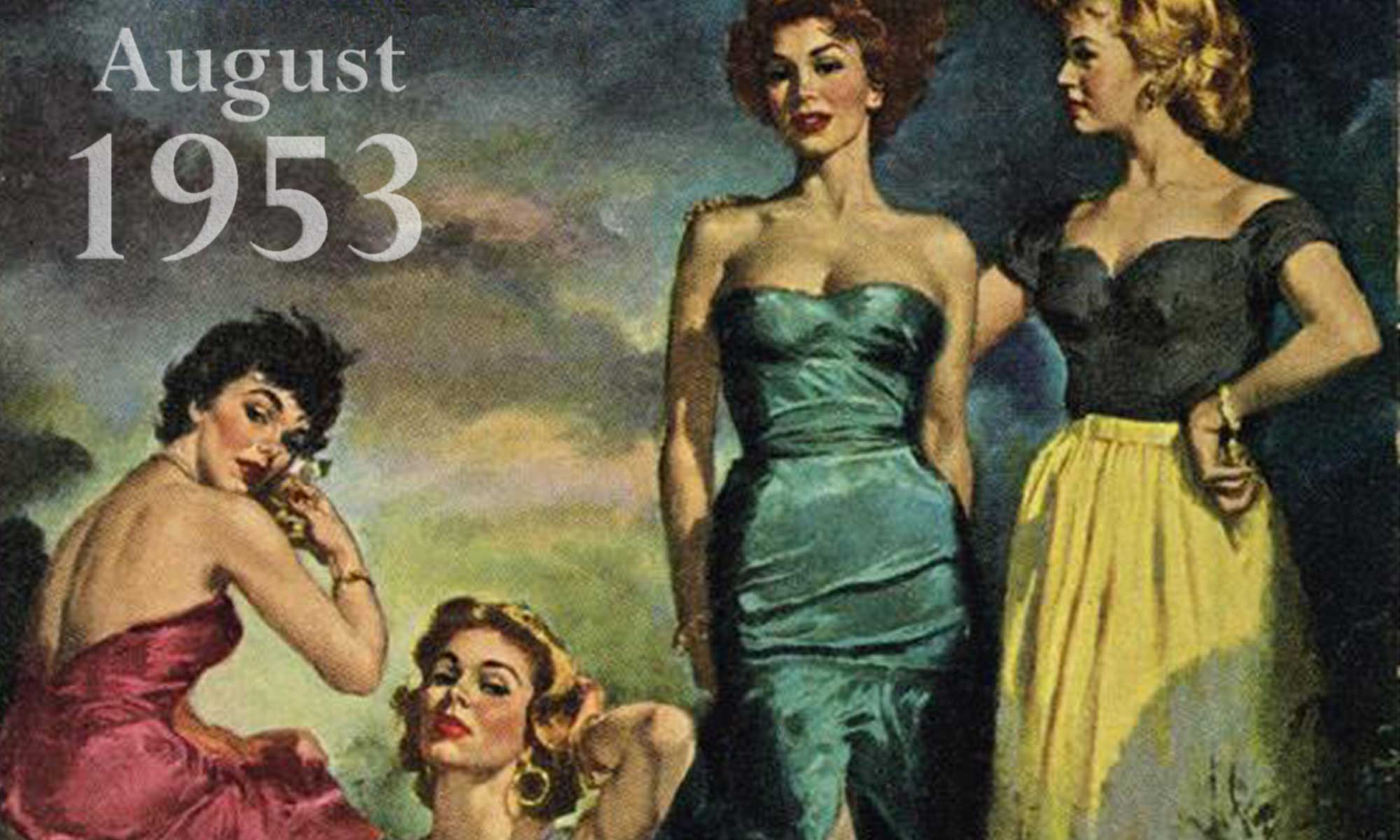| ◄ AUGUST ► | ||||||
|---|---|---|---|---|---|---|
| ◄ 1953 ► | ||||||
| 1 | ||||||
| 2 | 3 | 4 | 5 | 6 | 7 | 8 |
| 9 | 10 | 11 | 12 | 13 | 14 | 15 |
| 16 | 17 | 18 | 19 | 20 | 21 | 22 |
| 23 | 24 | 25 | 26 | 27 | 28 | 29 |
| 30 | 31 | |||||
| President: | Dwight D. Eisenhower (R) | |||
| Vice-President: | Richard M. Nixon (R) | |||
| House: | 213 (D) | 219 (R) | 1 (Other) | 2 (Vacant) |
| Southern states: | 100 (D) | 6 (R) | ||
| Senate: | 47 (D) | 46 (R) | 1 (Other) | 2 (Vacant) |
| Southern states: | 22 (D) | |||
| GDP growth: | 5.4% | (Annual) | (In recession since | |
| -0.6% | (Quarterly) | July 1953) | ||
| Inflation: | 0.8% | |||
| Unemployment: | 2.7% | |||
![]() Aug 2: British Prime Minister Winston Churchill is driven from the official Prime Minister’s country residence Chequers to the Royal Lodge at Windsor for a forty-five-minute audience with Queen Elizabeth II. This is his first audience with the Queen, who he normally sees weekly, since his stroke in June. He is still not expected to return to his office until September.
Aug 2: British Prime Minister Winston Churchill is driven from the official Prime Minister’s country residence Chequers to the Royal Lodge at Windsor for a forty-five-minute audience with Queen Elizabeth II. This is his first audience with the Queen, who he normally sees weekly, since his stroke in June. He is still not expected to return to his office until September.
![]()
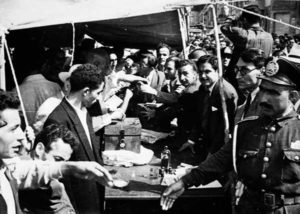 Aug 3: Iranian Prime Minister Mohammed Mossadegh wins more than 99.9 percent of the vote in the first phase of a plebiscite to dissolve the Majlis. Iran’s constitution doesn’t allow for a plebiscite to dissolve the nation’s parliament. Only the Shah has that power. But Mossadegh decided to call the plebiscite to go around the Shah, who also has the power to dismiss Mossadegh. So Mossadegh has called this plebiscite to ascertain “the will of the people,” which he says is a higher law. That’s not the only problem though. The ballot is not secret. Separate polling places are set up for those voting for and against the proposal, making it obvious to those outside the polling places how everyone is voting. Furthermore, voting slips require the voter to give his name, address, and his ID card number and place of issue. All of this makes the outcome pre-ordained. A large part of the voting is cast by members of the banned Tudeh (Communist) party, which is trying to ally with Mossadegh.
Aug 3: Iranian Prime Minister Mohammed Mossadegh wins more than 99.9 percent of the vote in the first phase of a plebiscite to dissolve the Majlis. Iran’s constitution doesn’t allow for a plebiscite to dissolve the nation’s parliament. Only the Shah has that power. But Mossadegh decided to call the plebiscite to go around the Shah, who also has the power to dismiss Mossadegh. So Mossadegh has called this plebiscite to ascertain “the will of the people,” which he says is a higher law. That’s not the only problem though. The ballot is not secret. Separate polling places are set up for those voting for and against the proposal, making it obvious to those outside the polling places how everyone is voting. Furthermore, voting slips require the voter to give his name, address, and his ID card number and place of issue. All of this makes the outcome pre-ordained. A large part of the voting is cast by members of the banned Tudeh (Communist) party, which is trying to ally with Mossadegh.
![]()
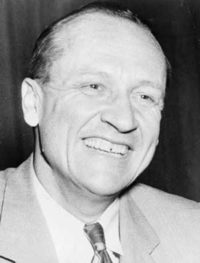 Aug 4: U.S. Senate Republicans choose Sen. William F. Knowland (R-CA) as Senate Majority Leader to replace the late Sen. Robert A. Taft (OH) who died last week. There are currently more Democrats than Republicans in the Senate. But because Independent Sen. Wayne Morse of Oregon says he will support Republicans on organizational issues, and with Vice President Richard Nixon casting any tie-breaking vote, Republicans will retain control.
Aug 4: U.S. Senate Republicans choose Sen. William F. Knowland (R-CA) as Senate Majority Leader to replace the late Sen. Robert A. Taft (OH) who died last week. There are currently more Democrats than Republicans in the Senate. But because Independent Sen. Wayne Morse of Oregon says he will support Republicans on organizational issues, and with Vice President Richard Nixon casting any tie-breaking vote, Republicans will retain control.
![]()
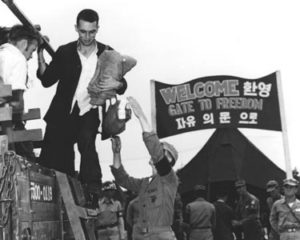 Aug 5: The first Prisoner of War exchanges take place at Panmunjom in Korea. Four hundred U.N. POWs held by the North are exchanged for 1,000 Chinese and North Korean prisoners who have elected to go back. These daily quotas will be met until all of the prisoners agreeing to repatriation are exchanged by September. Most of the prisoners exchanged in the first few days are ill or injured. The first official American POW to be returned was Pfc. Samuel E. Banuelos from Fresno, California. Altogether 70,183 North Korean and 5,640 Chinese POWs will be sent north, and 12,773 U.N. prisoners (including 7,862 South Koreans and 3,597 Americans) will be returned south.
Aug 5: The first Prisoner of War exchanges take place at Panmunjom in Korea. Four hundred U.N. POWs held by the North are exchanged for 1,000 Chinese and North Korean prisoners who have elected to go back. These daily quotas will be met until all of the prisoners agreeing to repatriation are exchanged by September. Most of the prisoners exchanged in the first few days are ill or injured. The first official American POW to be returned was Pfc. Samuel E. Banuelos from Fresno, California. Altogether 70,183 North Korean and 5,640 Chinese POWs will be sent north, and 12,773 U.N. prisoners (including 7,862 South Koreans and 3,597 Americans) will be returned south.
![]()
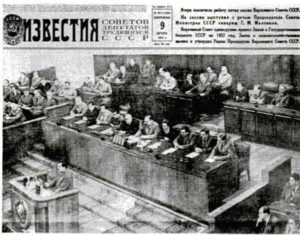 Aug 8: Soviet Premier Georgy Malenkov announces to 1,300 cheering members of the Supreme Soviet that “the United States has no monopoly in the production of the hydrogen bomb.” Western experts find the announcement unsurprising. They knew since January 1950 that physicist Klaus Fuchs, who confessed to spying for the Soviet Union, had passed along significant nuclear secrets including details of hydrogen fusion bombs. However, until there is actual evidence of the Soviets detonating a hydrogen bomb, some observers caution that the announcement may be a propaganda ploy.
Aug 8: Soviet Premier Georgy Malenkov announces to 1,300 cheering members of the Supreme Soviet that “the United States has no monopoly in the production of the hydrogen bomb.” Western experts find the announcement unsurprising. They knew since January 1950 that physicist Klaus Fuchs, who confessed to spying for the Soviet Union, had passed along significant nuclear secrets including details of hydrogen fusion bombs. However, until there is actual evidence of the Soviets detonating a hydrogen bomb, some observers caution that the announcement may be a propaganda ploy.
![]()
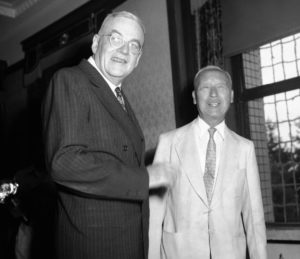 Aug 8: U.S. Secretary of State John Foster Dullers and South Korean Foreign Minister Pyun Yung Tai initial a draft of a mutual defense agreement between the U.S. and South Korea. The mutual defense pact had been a key demand by South Korean President Syngman Rhee as a condition for supporting the armistice.
Aug 8: U.S. Secretary of State John Foster Dullers and South Korean Foreign Minister Pyun Yung Tai initial a draft of a mutual defense agreement between the U.S. and South Korea. The mutual defense pact had been a key demand by South Korean President Syngman Rhee as a condition for supporting the armistice.
![]() Aug 8: Les Paul and Mary Ford’s single “Vaya Con Dios” begins its nine consecutive week run at number one. It will return to the top spot for two more weeks again in November.
Aug 8: Les Paul and Mary Ford’s single “Vaya Con Dios” begins its nine consecutive week run at number one. It will return to the top spot for two more weeks again in November.
![]()
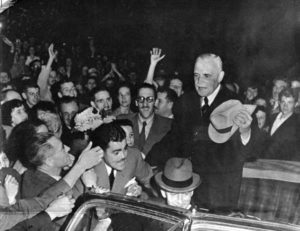 Aug 10: Canadian voters return the Liberals to power for the fifth time in the last eighteen years. Louis St. Laurent retains his post as Prime Minister, a position he has held since 1948. The Liberals now hold 169 seats in Parliament. The Progressive Conservatives hold 51, the Co-Operative Commonwealth 23, Social Credit 15, and seven others are distributed among other parties. While the Liberals hold a commanding seventy-three seat majority, the strength is down by twenty-two since the last election in 1949. Overall, turnout is low — 68%, compared to 75% in 1949 — because many potential voters are on vacation during the August election.
Aug 10: Canadian voters return the Liberals to power for the fifth time in the last eighteen years. Louis St. Laurent retains his post as Prime Minister, a position he has held since 1948. The Liberals now hold 169 seats in Parliament. The Progressive Conservatives hold 51, the Co-Operative Commonwealth 23, Social Credit 15, and seven others are distributed among other parties. While the Liberals hold a commanding seventy-three seat majority, the strength is down by twenty-two since the last election in 1949. Overall, turnout is low — 68%, compared to 75% in 1949 — because many potential voters are on vacation during the August election.
![]()
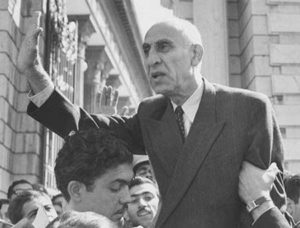 Aug 10: Iranian Prime Minister again wins more than 99.9 percent of the votes in the second phase of a plebiscite to dissolve the Majlis. This second round is held in various cities outside of Tehran. As in the first round of voting one week earlier, there is no secret ballot. Separate polling places are set up for those voting for and against the proposal, and voting slips require the voter to give his name, address, and his ID card number and place of issue. Under these conditions, the total result from both rounds surprises no one: 2,043,389 vote for Mossadegh’s proposal, and only 1,207 courageous souls vote against it. The rigged plebiscite reduces popular support for Mossadegh by angering liberals and conservatives alike. Some twenty newspapers in Tehran have come out against Mossadegh over the past two weeks. All of this makes Mossadegh more dependent on the officially-outlawed but tolerated Tudeh (Communist) party’s ability to turn out street demonstrations when needed.
Aug 10: Iranian Prime Minister again wins more than 99.9 percent of the votes in the second phase of a plebiscite to dissolve the Majlis. This second round is held in various cities outside of Tehran. As in the first round of voting one week earlier, there is no secret ballot. Separate polling places are set up for those voting for and against the proposal, and voting slips require the voter to give his name, address, and his ID card number and place of issue. Under these conditions, the total result from both rounds surprises no one: 2,043,389 vote for Mossadegh’s proposal, and only 1,207 courageous souls vote against it. The rigged plebiscite reduces popular support for Mossadegh by angering liberals and conservatives alike. Some twenty newspapers in Tehran have come out against Mossadegh over the past two weeks. All of this makes Mossadegh more dependent on the officially-outlawed but tolerated Tudeh (Communist) party’s ability to turn out street demonstrations when needed.
![]() Aug 12: British Prime Minister Winston Churchill arrives at 10 Downing Street for the first time since his stroke in June. He doesn’t stay long — two and a half hours — but he doffs his hat and waves to the crowd of tourists who happened to be on hand.
Aug 12: British Prime Minister Winston Churchill arrives at 10 Downing Street for the first time since his stroke in June. He doesn’t stay long — two and a half hours — but he doffs his hat and waves to the crowd of tourists who happened to be on hand.
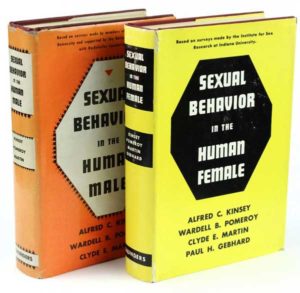 Aug 14: Kinsey’s “Sexual Behavior of the Human Female” is published. The reception for the second volume of Kinsey’s reports is very different from 1948’s Sexual Behavior of the Human Male. This time, we’re not talking about boys being boys, but the fairer sex. Discovering that more than 90% of women had indulged in sexual petting, 66% dreamed about sex, 62% masturbated, about half gave blow jobs, half had premarital sex, a quarter had cheated on their husbands, and a sixth had had sex with another woman at least once in their lives — all of that is seen as an attack on the sanctity of the American Mom and her apple pie. Kinsey is branded an enemy of religious propriety and American values. But not all reactions are negative. Many women find comforted in the knowledge they aren’t sexual freaks, and that many other women enjoy sex in all of its various forms as much as they do. Both volumes, collectively known as the Kinsey Reports, will provide ammunition for the reform of the nation’s antiquated morality laws, including those criminalizing adultery, homosexuality, and a number of other sexual activities between consenting adults, often even consenting married adults.
Aug 14: Kinsey’s “Sexual Behavior of the Human Female” is published. The reception for the second volume of Kinsey’s reports is very different from 1948’s Sexual Behavior of the Human Male. This time, we’re not talking about boys being boys, but the fairer sex. Discovering that more than 90% of women had indulged in sexual petting, 66% dreamed about sex, 62% masturbated, about half gave blow jobs, half had premarital sex, a quarter had cheated on their husbands, and a sixth had had sex with another woman at least once in their lives — all of that is seen as an attack on the sanctity of the American Mom and her apple pie. Kinsey is branded an enemy of religious propriety and American values. But not all reactions are negative. Many women find comforted in the knowledge they aren’t sexual freaks, and that many other women enjoy sex in all of its various forms as much as they do. Both volumes, collectively known as the Kinsey Reports, will provide ammunition for the reform of the nation’s antiquated morality laws, including those criminalizing adultery, homosexuality, and a number of other sexual activities between consenting adults, often even consenting married adults.![]() Aug 15: Iran’s Prime Minister Mohammed Mossadegh announces that he is unilaterally dissolving the Majlis as a result of the rigged referendums held earlier this month. In doing so, Mossadegh eliminates the last source of oppositional power in government. And with the Shah’s powers having been reduced to little more than a figurehead, Mossadegh is now the undisputed and unchallenged leader of Iran.
Aug 15: Iran’s Prime Minister Mohammed Mossadegh announces that he is unilaterally dissolving the Majlis as a result of the rigged referendums held earlier this month. In doing so, Mossadegh eliminates the last source of oppositional power in government. And with the Shah’s powers having been reduced to little more than a figurehead, Mossadegh is now the undisputed and unchallenged leader of Iran.
![]()
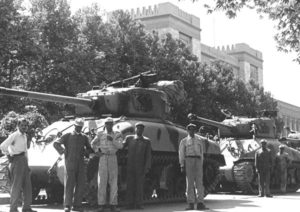 Aug 16: The Shah of Iran still possesses one key power under what’s left of the constitution — he can still legally dismiss Prime Minister Mohammed Mossadegh. The Shah issues a decree doing so, along with a second one naming retired Maj. Gen. Fazlollah Zahedi the new Prime Minister. According to a plan coordinated by the CIA and Britain’s SIS, the commander of the Imperial Guard arrives at Mossadegh’s residence with two truckloads of soldiers to deliver the first decree. Mossadegh however have been tipped off and his forces are waiting. Mossadegh’s guards quickly surround the Imperial Guard and arrest them. Within a few hours, the Shah’s Court Minister and several suspected pro-Shah military officers are rounded up, and pro-Mossadegh troops and tanks ring the Prime Minister’s home. Other pro-Shah military leaders lose their nerve and at 5:45 a.m., Radio Tehran announces that Mossadegh’s government has foiled a coup. The Shah and Queen Soraya Esfandiary-Bakhtiari flee the country for Iraq and Zahedi goes into hiding. Mossadegh’s Foreign Minister and close associate Hossein Fatemi holds a press conference in which he unleashes a savage attack on the Shah and his late father, Reza Shah, for whom many in Iran still hold great respect and esteem. But by the end of the day, Mossadegh appears firmly in power.
Aug 16: The Shah of Iran still possesses one key power under what’s left of the constitution — he can still legally dismiss Prime Minister Mohammed Mossadegh. The Shah issues a decree doing so, along with a second one naming retired Maj. Gen. Fazlollah Zahedi the new Prime Minister. According to a plan coordinated by the CIA and Britain’s SIS, the commander of the Imperial Guard arrives at Mossadegh’s residence with two truckloads of soldiers to deliver the first decree. Mossadegh however have been tipped off and his forces are waiting. Mossadegh’s guards quickly surround the Imperial Guard and arrest them. Within a few hours, the Shah’s Court Minister and several suspected pro-Shah military officers are rounded up, and pro-Mossadegh troops and tanks ring the Prime Minister’s home. Other pro-Shah military leaders lose their nerve and at 5:45 a.m., Radio Tehran announces that Mossadegh’s government has foiled a coup. The Shah and Queen Soraya Esfandiary-Bakhtiari flee the country for Iraq and Zahedi goes into hiding. Mossadegh’s Foreign Minister and close associate Hossein Fatemi holds a press conference in which he unleashes a savage attack on the Shah and his late father, Reza Shah, for whom many in Iran still hold great respect and esteem. But by the end of the day, Mossadegh appears firmly in power.
![]()
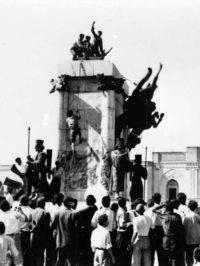 Aug 17: The government of Iran’s Prime Minister Mohammed Mossadegh continues arresting those involved in what the government calls an abortive coup. Arrests reportedly include sixteen civilians and fifteen officers, including two major generals and six colonels. An intense search is on for Maj. Gen. Fazlollah Zahedi, who, in an interview appearing in some of the day’s newspapers, maintains that he is the legitimate Prime Minister by virtue of his appointment by the Shah. (He is also hiding out at the U.S. embassy, which is looking for ways to recover from the previous day’s debacle.) According to Zahedi, it is Mossadegh who has staged a coup d’état by unconstitutionally dissolving the Majlis and defying a legitimate decree from the Shah removing him from office. A few papers also begin printing copies of the Shah’s two decrees. That same day, the Shah broadcasts from Baghdad a statement reiterating the same points that Zahedi has made. The Shah adds that while he left Iran for his own safety, he has not abdicated. Tudeh (Communist) Party members begin organizing pro-Mossadegh demonstrations in different parts of Tehran where they destroy several statues of the Shah and his late father.
Aug 17: The government of Iran’s Prime Minister Mohammed Mossadegh continues arresting those involved in what the government calls an abortive coup. Arrests reportedly include sixteen civilians and fifteen officers, including two major generals and six colonels. An intense search is on for Maj. Gen. Fazlollah Zahedi, who, in an interview appearing in some of the day’s newspapers, maintains that he is the legitimate Prime Minister by virtue of his appointment by the Shah. (He is also hiding out at the U.S. embassy, which is looking for ways to recover from the previous day’s debacle.) According to Zahedi, it is Mossadegh who has staged a coup d’état by unconstitutionally dissolving the Majlis and defying a legitimate decree from the Shah removing him from office. A few papers also begin printing copies of the Shah’s two decrees. That same day, the Shah broadcasts from Baghdad a statement reiterating the same points that Zahedi has made. The Shah adds that while he left Iran for his own safety, he has not abdicated. Tudeh (Communist) Party members begin organizing pro-Mossadegh demonstrations in different parts of Tehran where they destroy several statues of the Shah and his late father.
![]() Aug 18: Shah Mohammed Reza Pahlevi and Queen Queen Soraya Esfandiary-Bakhtiari fly from Baghdad to Rome. In Tehran, the government posts a 100,000 rial reward (US$1,200; about $11,200 today) for information leading to the arrest of Maj. Gen. Fazlollah Zahedi, who claims to being Iran’s legitimate prime minister. Some anti-Mossedegh newspapers print the Shah’s decrees dismissing Prime Minister Mohammed Mossadegh and appointing Zahedi, along with confirmation from the Shah in Iraq that he had signed the two decrees. Tudeh (Communist) partisans sack the headquarters of the Pan-Iranist Party (which was unenthusiastically allied with the Shah), and loot private businesses, shops and bazaars, while pro-Tudeh newspapers demand that the government legalize the outlawed party. Throughout the day, Tudeh party members tear down street signs and monuments referring to the Shah and erect party flags and signs bearing “popular” and “democratic republic” names. Nationalists, many armed with improvised weapons and backed by police, beat back the Tudeh mobs. The day’s actions by Teduh members create a violent backlash. That night, Security forces are given orders to clear the streets. Amidst the fighting, some police officers are heard shouting pro-Shah slogans. (Five decades later, the CIA will release documents showing that all of the mobs were seeded with rioters paid by the CIA. The documents will also show that in the evening, the CIA and British SIS try to call off any further actions to bolster Zahedi’s claim to the premiership in the belief that “the operation has been tried and failed.” The cables are ignored at the U.S. Embassy in Tehran.)
Aug 18: Shah Mohammed Reza Pahlevi and Queen Queen Soraya Esfandiary-Bakhtiari fly from Baghdad to Rome. In Tehran, the government posts a 100,000 rial reward (US$1,200; about $11,200 today) for information leading to the arrest of Maj. Gen. Fazlollah Zahedi, who claims to being Iran’s legitimate prime minister. Some anti-Mossedegh newspapers print the Shah’s decrees dismissing Prime Minister Mohammed Mossadegh and appointing Zahedi, along with confirmation from the Shah in Iraq that he had signed the two decrees. Tudeh (Communist) partisans sack the headquarters of the Pan-Iranist Party (which was unenthusiastically allied with the Shah), and loot private businesses, shops and bazaars, while pro-Tudeh newspapers demand that the government legalize the outlawed party. Throughout the day, Tudeh party members tear down street signs and monuments referring to the Shah and erect party flags and signs bearing “popular” and “democratic republic” names. Nationalists, many armed with improvised weapons and backed by police, beat back the Tudeh mobs. The day’s actions by Teduh members create a violent backlash. That night, Security forces are given orders to clear the streets. Amidst the fighting, some police officers are heard shouting pro-Shah slogans. (Five decades later, the CIA will release documents showing that all of the mobs were seeded with rioters paid by the CIA. The documents will also show that in the evening, the CIA and British SIS try to call off any further actions to bolster Zahedi’s claim to the premiership in the belief that “the operation has been tried and failed.” The cables are ignored at the U.S. Embassy in Tehran.)
![]()
 Aug 18: British Prime Minister Winston Churchill holds a surprise Cabinet meeting at 10 Downing Street for the first time since June 24. News of Churchill’s stroke on June 23 has been withheld from the public, which has been told that Churchill’s doctors prescribed an extended rest for “exhaustion.” Today’s Cabinet meeting is seen as a sign that Churchill is back at work, although some observers suspect that the main reason for the Cabinet meeting is to give the nation just such a sign.
Aug 18: British Prime Minister Winston Churchill holds a surprise Cabinet meeting at 10 Downing Street for the first time since June 24. News of Churchill’s stroke on June 23 has been withheld from the public, which has been told that Churchill’s doctors prescribed an extended rest for “exhaustion.” Today’s Cabinet meeting is seen as a sign that Churchill is back at work, although some observers suspect that the main reason for the Cabinet meeting is to give the nation just such a sign.
![]()
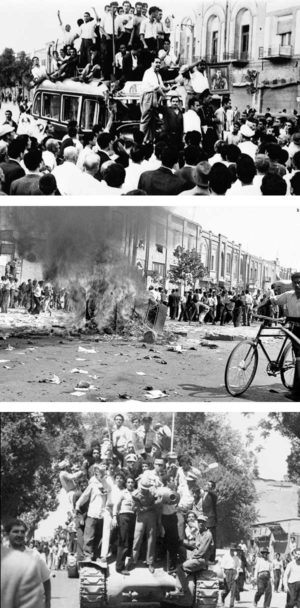 Aug 19: In Tehran, six newspapers print the Shah’s decrees deposing Prime Minister Mohammed Mossadegh and appointing Maj. Gen. Fazlollah Zahedi to succeed him. That is in addition to the many thousand broadsheets bearing a photostatic copy of the decrees that suddenly show up in the streets. Pro-Shah crowds assemble in the bazaar area in the morning, alarmed at the outlawed Tudeh (Communist) party’s shows of strength over the two days. The crowd, egged on by CIA and SIS-backed participants, sacks and sets fire to one pro-Mossadegh and three pro-Tudeh newspapers. By 11:30, pro-Shah elements in the military and police, who had mostly remained on the sidelines, finally arrive and begin taking up positions at the parliament building and other squares throughout the city. The pro-Shah demonstrators march toward Mossadegh’s residence. They are met by pro-Mossadegh troops, which fire above the crowds but are unwilling to fire into it. A pitched tank and rifle battle ensues between pro-Shah and pro-Mossadegh forces in front of Mossadegh’s house. When the pro-Shah forces overwhelm the Premier’s household guard, they find that Mossadegh had escaped. At 2:20 p.m., Radio Tehran, which had been broadcasting cotton prices and music, falls into royalist hands and begins broadcasting the Shah’s decrees and news of the uprising. At 5:30, Zahedi broadcasts a triumphant speech to the nation.
Aug 19: In Tehran, six newspapers print the Shah’s decrees deposing Prime Minister Mohammed Mossadegh and appointing Maj. Gen. Fazlollah Zahedi to succeed him. That is in addition to the many thousand broadsheets bearing a photostatic copy of the decrees that suddenly show up in the streets. Pro-Shah crowds assemble in the bazaar area in the morning, alarmed at the outlawed Tudeh (Communist) party’s shows of strength over the two days. The crowd, egged on by CIA and SIS-backed participants, sacks and sets fire to one pro-Mossadegh and three pro-Tudeh newspapers. By 11:30, pro-Shah elements in the military and police, who had mostly remained on the sidelines, finally arrive and begin taking up positions at the parliament building and other squares throughout the city. The pro-Shah demonstrators march toward Mossadegh’s residence. They are met by pro-Mossadegh troops, which fire above the crowds but are unwilling to fire into it. A pitched tank and rifle battle ensues between pro-Shah and pro-Mossadegh forces in front of Mossadegh’s house. When the pro-Shah forces overwhelm the Premier’s household guard, they find that Mossadegh had escaped. At 2:20 p.m., Radio Tehran, which had been broadcasting cotton prices and music, falls into royalist hands and begins broadcasting the Shah’s decrees and news of the uprising. At 5:30, Zahedi broadcasts a triumphant speech to the nation.
![]()
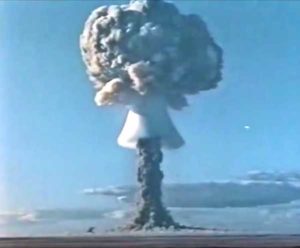 Aug 20: Pravda publishes an official announcement: “Within the last few days an explosion of one of a variety of hydrogen bombs was carried out for experimental purposes.” The U.S. Atomic Energy Commission confirms that it had detected the Soviet test on August 12, and that their data indicates that the detonation was indeed a hydrogen bomb, although later analysis will dispute that. It will turn out that the bomb was a kind of a hybrid fission/fusion bomb that produced a ten-fold higher yield than an ordinary atomic bomb. The Soviet Union will not detonate a true hydrogen bomb until 1955, but this bomb does give the Soviets H-bomb bragging rights. The U.S. had officially revealed in January that it has detonated a hydrogen bomb, following numerous unofficial reports of a test in November.
Aug 20: Pravda publishes an official announcement: “Within the last few days an explosion of one of a variety of hydrogen bombs was carried out for experimental purposes.” The U.S. Atomic Energy Commission confirms that it had detected the Soviet test on August 12, and that their data indicates that the detonation was indeed a hydrogen bomb, although later analysis will dispute that. It will turn out that the bomb was a kind of a hybrid fission/fusion bomb that produced a ten-fold higher yield than an ordinary atomic bomb. The Soviet Union will not detonate a true hydrogen bomb until 1955, but this bomb does give the Soviets H-bomb bragging rights. The U.S. had officially revealed in January that it has detonated a hydrogen bomb, following numerous unofficial reports of a test in November.
![]() Aug 20: Former Iranian Prime Minister Mohammed Mossadegh comes out of hiding and surrenders following an insurrection that swept Maj. Gen. Fazlollah Zahedi into power and restored the Shah to the Peacock Throne. Mossadegh and three top aides are taken into custody at Zahedi’s headquarters in Tehran.
Aug 20: Former Iranian Prime Minister Mohammed Mossadegh comes out of hiding and surrenders following an insurrection that swept Maj. Gen. Fazlollah Zahedi into power and restored the Shah to the Peacock Throne. Mossadegh and three top aides are taken into custody at Zahedi’s headquarters in Tehran.
![]()
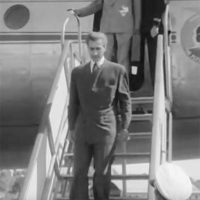 Aug 22: Shah Mohammed Riza Pahlevi returns triumphantly to Tehran just six days after he fled the country. As the Shah’s motorcade makes its way to Saadabad Palace, royalists slaughter sheep in thanksgiving along the road as the Shah passes.
Aug 22: Shah Mohammed Riza Pahlevi returns triumphantly to Tehran just six days after he fled the country. As the Shah’s motorcade makes its way to Saadabad Palace, royalists slaughter sheep in thanksgiving along the road as the Shah passes.
![]()
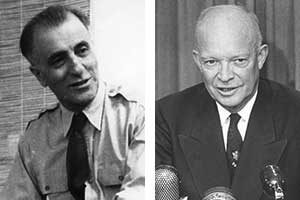 Aug 26: The new Iranian Prime Minister, Gen. Fazlollah Zahedi, and President Eisenhower exchange letters addressing Iran’s pressing financial crisis. Zahedi writes, “The treasury is empty; foreign exchange resources are exhausted; the national economy is deteriorated. Iran needs immediate financial aid to enable it to emerge from a state of economic and financial chaos.” Eisenhower responds: “…I have authorized my Ambassador to Iran to consult with you regarding the development of our aid program there. I recognize that your needs are pressing. Your request will receive our sympathetic consideration and I can assure you that we stand ready to assist you.” This is a notable turnaround since the previous June, when Eisenhower told then-Premier Mohammed Mossadegh that the U.S. would not provide additional aid without an agreement to end Iran’s oil dispute with Britain over the loss of Anglo-Iranian Oil Company’s extensive holdings in Iran due to Iran’s nationalization action.
Aug 26: The new Iranian Prime Minister, Gen. Fazlollah Zahedi, and President Eisenhower exchange letters addressing Iran’s pressing financial crisis. Zahedi writes, “The treasury is empty; foreign exchange resources are exhausted; the national economy is deteriorated. Iran needs immediate financial aid to enable it to emerge from a state of economic and financial chaos.” Eisenhower responds: “…I have authorized my Ambassador to Iran to consult with you regarding the development of our aid program there. I recognize that your needs are pressing. Your request will receive our sympathetic consideration and I can assure you that we stand ready to assist you.” This is a notable turnaround since the previous June, when Eisenhower told then-Premier Mohammed Mossadegh that the U.S. would not provide additional aid without an agreement to end Iran’s oil dispute with Britain over the loss of Anglo-Iranian Oil Company’s extensive holdings in Iran due to Iran’s nationalization action.
![]() Aug 31: The U.S. Atomic Energy Commission announces that it has detected an atomic detonation “in Russian territory” on August 23. The AEC says that this detonation is consistent with ordinary nuclear detonations and is not a hydrogen bomb test.
Aug 31: The U.S. Atomic Energy Commission announces that it has detected an atomic detonation “in Russian territory” on August 23. The AEC says that this detonation is consistent with ordinary nuclear detonations and is not a hydrogen bomb test.
![[Emphasis Mine]](http://jimburroway.com/wp-content/uploads/2018/01/Gay_Rights_demonstration_NYC_1976.jpg)
